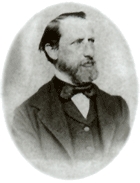|
Julius Maggi
Julius Michael Johannes Maggi (9 October 1846 – 19 October 1912) was a Swiss people, Swiss entrepreneur, inventor of precooked soups and Maggi sauce. He is best known for founding Maggi, which was merged with Nestlé in 1947. Biography Julius was born in Frauenfeld, Switzerland in 1846. In 1869, he inherited his father's hammer mill. He died in 1912 at the age of 66. Career In the early 1880s, Julius began experimenting to invent a new type of flour. In 1882, he finally began selling flour and founded Maggi. In 1886, he launched ''Maggi'' seasoning. In 1886, Julius invented the first instant soup in the world. It was invented in his Kemptthal factory. By 1888, he began selling to countries all around Europe, including Germany, France, and Italy. Gallery Maggi Rechnung 1892.jpg, Bill of the Fabrik von Maggi's Nahrungsmitteln AG, issued 12. July 1892; exposed by Julius Maggi Fabrik von Maggis Nahrungsmitteln 1894.jpg, Share of the Fabrik von Maggi's Nahrungsmitteln ... [...More Info...] [...Related Items...] OR: [Wikipedia] [Google] [Baidu] |
Swiss People
The Swiss people (, , , ) are the citizens of the multi-ethnic Swiss Confederation (Switzerland) regardless of ethno-cultural background or people of self-identified Swiss ancestry. The number of Swiss nationals has grown from 1.7 million in 1815 to 8.7 million in 2020. More than 1.5 million Swiss citizens hold multiple citizenship. About 11% of citizens live abroad (0.8 million, of whom 0.6 million hold multiple citizenship). About 60% of those living abroad reside in the European Union (0.46 million). The largest groups of Swiss descendants and nationals outside Europe are found in the United States, Brazil, and Canada. Although the modern state of Switzerland originated in 1848, the period of romantic nationalism, Switzerland is not a nation-state and the Swiss are not a single ethnic group. Rather, Switzerland is a confederacy (') or ' ("nation of will", "nation by choice", that is, a consociational state), a term coined in conscious contrast to "nation" in the conv ... [...More Info...] [...Related Items...] OR: [Wikipedia] [Google] [Baidu] |
Maggi
Maggi (, ) is an international brand of seasonings, instant soups, and noodles that originated in Switzerland in the late 19th century. In 1947, the Maggi brand was acquired by the Switzerland, Swiss giant Nestlé. History Early history In 1869, Julius Maggi (1846–1912) took over his father's mill business in Lindau, Switzerland, Kemptthal, Switzerland. Under his leadership, the business developed into one of the pioneers of industrial food production, with the aim of improving the diet of working-class families through better nutrient supply and faster preparation. In 1882, at a meeting of the Swiss "Common Good Society" (), the doctor and factory inspector Fridolin Schuler spoke about the miserable nutritional situation of the factory workers: women workers no longer had enough time to cook for their families; cold meals or alcohol often replaced warm meals; meals were served in factory canteens and were cheap but not sufficiently nutritious. The consequences were mal ... [...More Info...] [...Related Items...] OR: [Wikipedia] [Google] [Baidu] |
Nestlé
Nestlé S.A. ( ) is a Swiss multinational food and drink processing conglomerate corporation headquartered in Vevey, Switzerland. It has been the largest publicly held food company in the world, measured by revenue and other metrics, since 2014."Nestlé's Brabeck: We have a 'huge advantage' over big pharma in creating medical foods" , CNN Money, 1 April 2011 It ranked No. 64 on the Fortune Global 500, ''Fortune'' Global 500 in 2017. In 2023, the company was ranked 50th in the Forbes Global 2000, ''Forbes'' Global 2000. Nestlé's products include coffee and tea, candy and confectionery, bottled water, infant formula and baby food, Dairy product, dairy products and ice cream, frozen foods, breakfast cere ... [...More Info...] [...Related Items...] OR: [Wikipedia] [Google] [Baidu] |
Frauenfeld
Frauenfeld (Alemannic German, Alemannic: ''Frauefäld'') is the capital of the Cantons of Switzerland, canton of Canton of Thurgau, Thurgau in Switzerland. The official language of Frauenfeld is (the Swiss variety of Standard) Swiss Standard German, German, but the main spoken language is the local variant of the Alemannic German, Alemannic Swiss German (linguistics), Swiss German dialect. History Early history The earliest traces of human settlement are several La Tène culture, La Tène era graves to the east of Langdorf. The Switzerland in the Roman era, Roman road from Oberwinterthur (''Vitudurum'') to Pfyn ran through what is now the ''Allmend'' in Frauenfeld. Two Roman villas were discovered in Thalbach and Oberkirch. The villa seems to have become the focal point of the later settlement of Oberkirch. On the ruins of the villa, an Early Middle Ages cemetery was built, and by the 9th century, the Oberkirch church was built. Perhaps as a result of royal donation in th ... [...More Info...] [...Related Items...] OR: [Wikipedia] [Google] [Baidu] |
Flour
Flour is a powder made by Mill (grinding), grinding raw grains, List of root vegetables, roots, beans, Nut (fruit), nuts, or seeds. Flours are used to make many different foods. Cereal flour, particularly wheat flour, is the main ingredient of bread, which is a staple food for many cultures. Maize flour, Corn flour has been important in Mesoamerican cuisine since ancient times and remains a staple in the Americas. Rye flour is a constituent of bread in both Central Europe and Northern Europe. Cereal flour consists either of the endosperm, cereal germ, germ, and bran together (whole-grain flour) or of the endosperm alone (refined flour). ''Meal'' is either differentiable from flour as having slightly coarser particle size (degree of comminution) or is synonymous with flour; the word is used both ways. The Centers for Disease Control and Prevention, CDC has cautioned not to eat raw flour doughs or batters. Raw flour can contain harmful bacteria such as ''E. coli'' and needs ... [...More Info...] [...Related Items...] OR: [Wikipedia] [Google] [Baidu] |
Kemptthal
Lindau is a municipality in the district of Pfäffikon in the canton of Zürich in Switzerland. History Lindau is first mentioned in 774 as ''Lintauvia''. Geography Lindau has an area of . Of this area, 47.4% is used for agricultural purposes, while 34% is forested. Of the rest of the land, 18.2% is settled (buildings or roads) and the remainder (0.3%) is non-productive (rivers, glaciers or mountains). housing and buildings made up 9% of the total area, while transportation infrastructure made up the rest (9.1%). Of the total unproductive area, water (streams and lakes) made up 0.2% of the area. 13.7% of the total municipal area was undergoing some type of construction. The municipality if located in the western portion of the lower Kempt valley. It includes the villages of Lindau, Tagelswangen, Winterberg and Grafstal. Demographics Lindau has a population (as of ) of . , 18.3% of the population was made up of foreign nationals. the gender distribution of the popul ... [...More Info...] [...Related Items...] OR: [Wikipedia] [Google] [Baidu] |
Portable Soup
Portable soup was a form of dehydrated food of English origin used in the 18th and 19th centuries. It was a precursor of meat extract and bouillon cubes, and of industrially dehydrated and instant food. It is also known as pocket soup or veal glue. It is essentially a partially dehydrated broth and a solid counterpart of the '' glace de viande'' (meat glaze) used in French cuisine. It was long a staple of British seamen, military and explorers, as it would keep for many months or even a year. In this context, it was considered a filling and nutritious dish. Process Portable soup was made from a slow-cooked beef or veal broth (often 6 to 8 hours), reduced, degreased to remove the fat (which may spoil and become rancid over time) and then reduced repeatedly until it solidified into a jelly. Once it was sufficiently gelatinous to hold its form, it was placed on pieces of flannel or unglazed earthenware dishes and rotated regularly to dry it further. Historically, this was a s ... [...More Info...] [...Related Items...] OR: [Wikipedia] [Google] [Baidu] |
1846 Births
Events January–March * January 5 – The United States House of Representatives votes to stop sharing the Oregon Country with the United Kingdom. * January 13 – The Milan–Venice railway's bridge, over the Venetian Lagoon between Mestre and Venice in Italy, opens, the world's longest since 1151. * January 23 – Ahmad I ibn Mustafa, Bey of Tunis, declares the legal abolition of slavery in Tunisia. * February 4 – Led by Brigham Young, many Mormons in the U.S. begin their migration west from Nauvoo, Illinois, to the Great Salt Lake in what becomes Utah. * February 10 – First Anglo-Sikh war: Battle of Sobraon – British forces in India defeat the Sikhs. * February 18 – The Galician Peasant Uprising of 1846 begins in Austria. * February 19 – Texas annexation: United States president James K. Polk's annexation of the Republic of Texas is finalized by Texas president Anson Jones in a formal ceremony of transfer of sovereignty. The newly formed ... [...More Info...] [...Related Items...] OR: [Wikipedia] [Google] [Baidu] |
1912 Deaths
This year is notable for Sinking of the Titanic, the sinking of the ''Titanic'', which occurred on April 15. In Albania, this leap year runs with only 353 days as the country achieved switching from the Julian to Gregorian Calendar by skipping 13 days. Friday, 30 November ''(Julian Calendar)'' immediately turned Saturday, 14 December 1912 ''(in the Gregorian Calendar)''. Events January * January 1 – The Republic of China (1912–49), Republic of China is established. * January 5 – The Prague Conference (6th All-Russian Conference of the Russian Social Democratic Labour Party) opens. * January 6 ** German Geophysics, geophysicist Alfred Wegener first presents his theory of continental drift. ** New Mexico becomes the 47th U.S. state. * January 8 – The African National Congress is founded as the South African Native National Congress, at the Waaihoek Wesleyan Church in Bloemfontein, to promote improved rights for Black people, black South Africans, with Joh ... [...More Info...] [...Related Items...] OR: [Wikipedia] [Google] [Baidu] |
People From Frauenfeld
The term "the people" refers to the public or common mass of people of a polity. As such it is a concept of human rights law, international law as well as constitutional law, particularly used for claims of popular sovereignty. In contrast, a people is any plurality of persons considered as a whole. Used in politics and law, the term "a people" refers to the collective or community of an ethnic group or nation. Concepts Legal Chapter One, Article One of the Charter of the United Nations states that "peoples" have the right to self-determination. Though the mere status as peoples and the right to self-determination, as for example in the case of Indigenous peoples (''peoples'', as in all groups of indigenous people, not merely all indigenous persons as in ''indigenous people''), does not automatically provide for independent sovereignty and therefore secession. Indeed, judge Ivor Jennings identified the inherent problems in the right of "peoples" to self-determination, as i ... [...More Info...] [...Related Items...] OR: [Wikipedia] [Google] [Baidu] |
Swiss Businesspeople
Swiss most commonly refers to: * the adjectival form of Switzerland *Swiss people Swiss may also refer to: Places * Swiss, Missouri * Swiss, North Carolina * Swiss, West Virginia * Swiss, Wisconsin Other uses * Swiss Café, an old café located in Baghdad, Iraq *Swiss-system tournament, in various games and sports * Swiss International Air Lines **Swiss Global Air Lines, a subsidiary *Swissair, former national air line of Switzerland * .swiss alternative TLD for Switzerland See also *Swiss made, label for Swiss products *Swiss cheese (other) *Switzerland (other) *Languages of Switzerland, none of which are called "Swiss" *International Typographic Style, also known as Swiss Style, in graphic design *Schweizer (other), meaning Swiss in German *Schweitzer Schweitzer is a surname. Notable people with the surname include: * Albert Schweitzer (1875–1965), German theologian, musician, physician, and medical missionary, winner of the 1952 Nobel Peace Priz ... [...More Info...] [...Related Items...] OR: [Wikipedia] [Google] [Baidu] |






